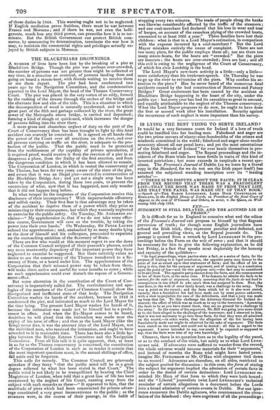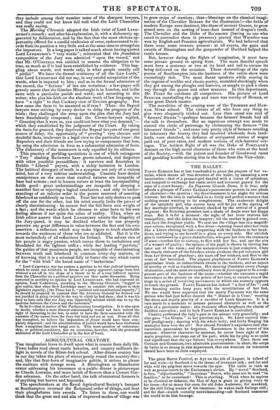IS LYING THE BEST THING TO SERVE IRELAND? IT would
be a very fortunate event for Ireland if a love of truth could be instilled into her leading men. Falsehood and anger are the two prime movers of ninety-nine-hundredths of the crimes and misdeeds committed in the world; falsehood and anger alone render necessary almost all our penal laws; and yet the most ostentatious of the Irish "friends of Ireland " for ever bestir themselves in pro- moting falsehood and anger. The Repeal proceedings and the in- cidents of the State trials have been fertile in traits of this kind of inverted patriotism ; but none exceeds in turpitude a recent spe- cimen. The Freeman's Journal of Dublin (as we learn by a literal copy in the Standard, for we do not see the Irish paper itself) has assumed the subjoined standing inscription over its " leading articles"— YET— JUDGMENT IS STILL DELAYED, AND THE ACCUSED LIE IN PRISON."
It is difficult for us in England to conceive what end the editor of the Freeman's Journal can propose to himself by that flagrant perversion of truth ; for though some English journalists have echoed the Irish trick, they represent peculiar and defeated, not general and prevailing views, as the Repeal journals do. The passage is quoted from a remark by Lord LYNDHURST in the pro- ceedings before the Peers on the writ of error ; and that it should be necessary for him to give the following explanation, as be did last Friday, is a fact that speaks most deplorably for the honesty and capacity of the quibblers— "In legal proceedings, when parties state a fact, or a series of facts, for the purpose of leading to a legal conclusion, the opposite party may demur to the point of law so raised upon that statement of facts; and the effect of his so doing is this, that for the purpose of argument, and of coming to a conclusion upon the point of law—and for this purpose only—the fact may be considered to be admitted. The opposite party cannot deny the facts, and the consequences in law of those facts, at the same time. If be demurs, be admits the facts to be correct for the sake of argument, merely assuming that the facts do not lead to consequences in law which he who avers them has assigned to them. Now, the case here, in the writ of error lately heard, was a challenge to the array. This was a point on the record ; and the facts which led to it also were stated, namely, that a fraudulent list had been made out by some person unknown, with a view to prejudice the case of the defendants, and that a jury was made up from that list. To this challenge the Attorney-General for Ireland de- murred; the effect of which was as much as to say to the traversers, Assuming the facts to be as you have stated them, they are no ground for a challenge to the array.' In the course of his argument, Mr. Hill was going into some detail as to the facts alleged in the challenge of the traversers; and I observed to him, that it was not necessary to go into those facts, for that they were all admitted on the record,—in other words, that the allegation of the list having been fraudulently made out might be admitted for the sake of argument. The facts were stated on the record, and could not be denied : all this in regard to the argument. I never intended to say, nor could I be expected or supposed to say, that the facts were true of my own knowledge."
Observe, there is no question here as to the legality of the panel, or as to the conduct of the trials, but solely as to what Lord LYND- immix said. If advocates were suffered to wander from the record, the whole universe would become materials for their "arguments," and instead of months the State trial might have lasted years: imagine Mr. FITZGIBBON or Mr. O'llse with eloquence tied down to no record ! Advocates are therefore, on all sides, restricted to the subject posited fordiscussion : in this case, the form of stating the subject for argument implied the admission of certain facts in order to the denial of certain deductions: Lord LYNDHURST re- minded Mr. Him. of that form to which they were both bound ; and the "Liberal" journalists twist Lord LYNDHURST'S technical reminder of certain allegations in a document before the Lords into a broad admission of certain events in Dublin. Nor can igno- rance exonerate the Dublin agitators, who countenanced the circu- lation of the falsehood : they were cognizant of all the proceedings ; "THERE IS NO DISPUTE ABOUT THE FACTS; IT IS CLEAR FROM THE RECORD THAT THERE WAS A FRAUDULENT LIST—THAT THE BOOK WAS MADE UP FROM THAT LIST, AND THAT THE PANEL WAS MADE OUT OF THAT BOOK.' —Speech of—THE BARON LYNDHURST, LORD HIGH CHANCELLOR OF ENGLAND, in the English House of Lords, as President of the final Court of Appeal, in the case of O'Connell and Others, in error, v. the Queen, ON Wed- nesday 10th July 1844.
they include among their number some of the sharpest lawyers, and they could not but know full well what the Lord Chancellor was really saying.
The Morning Chronicle adopted the Irish twist of Lord LYND- Trusses remark ; and after his explanation, it, with a dishonesty ag- gravated by deliberation, and by the fact that the most obvious op- portunity offered for a candid confession of error, endeavoured to re- cede from its position a very little and at the same time to strengthen the imposture. In a long paper it talked much about having quoted Lord LYNDHURST'S "very words" ; reiterated that the fraudulent composition of the Jury was admitted " upon the record," and that Mr. O'CONNELL was entitled to assume the allegation to be tree, as much as if it had been established by evidence. This hag- gling about words, and words only, is what people usually call " pitiful." We have the formal testimony of all the Law Lords,* that Lord LYN DHURST did not say, in any candid acceptation of the words, what is imputed to him ; and as to the formal admission of the record, the " fictions" of law are notorious : a law-paper will gravely assert that the Grecian Missolonghi is in London, and is the same with a particular parish and ward; and according to this writer, who pins his faith on the absolute truth of law language, we have " a right " to that Cockney view of Grecian geography. But how came the facts to be assumed as if true ? Thus : the Repeal lawyers were striving by every device to delay the progress of the trials ; they challenged the array upon the plea that the Jury had been fraudulently composed ; and the Crown-lawyers replied, 4' Granting that it were so, you could not have what you demand,"— which they established by the judgment of the Court. By taking the facts for granted, they deprived the Repeal lawyers of one great source of delay, the opportunity of " proving " very obscure and doubtful facts, irrelevant in a legal view to the particular issue : the Repeaters and their friends are now trying to compensate that loss, by using the admission in form as a substantial admission of facts. The dishonesty of the manoeuvre is only equalled by its silliness.
This practice of garbling quotations is one of which outrageous " Tory ' slashing Reviewers have grown ashamed, and forgotten with other youthful peccadilloes : it survives and flourishes in Dublin " Liberal " papers, with a sickly imitation in London. The habitual disregard of truth is a symptom not only of a vicious mind, but of a very inferior understanding. Casuists have denied omnipotence on the score that exalted natures are incapable of base bad actions ; and in human nature at least the incompatibility holds good : great understandings are incapable of denying a manifest fact or rejecting a logical conclusion ; and only to under- standings of an inferior order is the power reserved of asserting falsehood as confidently as truth. Your liar not only desires to pass off the one for the other, but his mind usually lacks the power of clearly discriminating : he cannot feel the full force and weight of a fact ; and the words which he chooses to utter have to his own feeling almost if not quite the value of reality. Thus, when an Irish editor asserts that Lord LYNDHURST admits the illegality of the Jury-panel, it may be doubted whether he can properly perceive any great difference in value between the fact and his own assertion : a reflection which may make bigots to truth charitable towards the weakness of those who are so addicted. But it is the most melancholy of all reflections for Ireland. The salient vice of her people is angry passion, which moves them to turbulence and bloodshed for the lightest trifles ; while her leading " patriots," the guides of that passionate people, are incapable of discriminating between truth and falsehood in common every-day matters, or of knowing that it is a criminal folly to foster the vice which earns for the " wild Irish" the hated name of " barbarians."
" Lord CAMPBELL was too zealous a partisan to let that judicial testimony which he could not withhold, in favour of a party opponent, escape from him without a set-off in the shape of a threat to be of a very different opinion from the Chancellor on a political question not then under discussion. Being corrected in ascribing an opinion to Lord LYNDHURST, who had expressed no opinion, Lord CAMPBELL, according to the Morning Chronicle, "begged to give notice, that when their Lordships came to consider this subject in their legislative capacity, [the Times has it, "political and constitutional capacity,"] he should be prepared to contend that the Attorney-General for Ireland was not justified in going to trial in the way in which he had done ; that it was his duty to have seen that the Jury was impartially selected which was to try the question between the Crown and the traversers.'
So be it—that is matter of fair Parliamentary investigation. It is also open to doubt, whether a more discreet statesmanship would not have waived the right of demurring to the law, in order to have the facts connected with the Omission of the names from the Jury-list tried and set at rest. From all that has transpired, we believe the imputation of fraud would have been com- pletely disproved; and the administration of justice would have been vindicated from a suspicion that now hangs over it. This moot question of statesman- ship, or political expediency, has no connexion, however, with the pretended admission of the Lord Chancellor as to the fact of fraud.



























 Previous page
Previous page